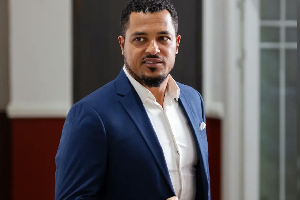Ghanaian actor Van Vicker has called for better safety measures in African film productions after reports emerged that Nollywood actor Godwin Nnadiekwe was hospitalised after an accidental kick from Zubby Michael during a movie shoot.
Van Vicker described the news as disquieting. In a message shared on his social media platforms, he expressed concern over how such accidents continue to occur in an industry that lacks basic safety measures.
“The headline about an actor sustaining internal bleeding (I am yet to authenticate) by virtue of another actor stumping (not maliciously) him in his torso during filming is extremely disquieting,” Van Vicker wrote.
He acknowledged that such injuries are sometimes not deliberate but stressed the importance of proper rehearsals for scenes that involve physical contact.
“Be that as it may, I personally, consistently insist that outraged scenes that have potential contact or actual contact with another actor or actors should be rehearsed especially in our film setting where there is no insurance, no body doubles, no stunt actors and where more often than not real props are used (knife, etc),” he explained.
Van Vicker pointed out that in most African film sets, there is no insurance coverage for actors, no trained stunt performers, and no safety tools like body doubles.
This, he says, makes it more important to rehearse scenes that involve physical action.
He noted that while some directors argue that rehearsing might make a scene feel less spontaneous, Van Vicker believes that such concerns should never be prioritised over an actor’s safety.
“Some directors or filmmakers argue that rehearsal may take away the surprise element, potential excellent reflexes, fantastic instincts etc. I have a reserved concurrence. What’s the fate of the actor in situations where there is zero rigging to protect the actor in perilous moments?” he questioned.
Van Vicker emphasised that rehearsals are not just for show, they are a necessary part of keeping actors safe, especially in productions where resources are limited.
“Rehearsal cannot be downplayed for ‘great’ acting, time limitation, etc. exclusively in the absence of safety harnesses. Acting in action scenes or violent scenes can be precarious,” he said.
He further explained that the mark of a great actor is not only in delivering a believable performance, but in doing so within a well-prepared and safe environment.
“So, I believe that great acting is one where you know what to expect, because you have read the script, you have been given directives by the director, etc., and yet you make it all believable,” he added.
Van Vicker acknowledged that even rehearsed scenes can still result in injuries, but emphasized that if proper safety steps were followed, producers would not be held responsible for negligence.
“I absolutely agree that actually performing an already rehearsed scene may lead to an inevitable outcome, however the point is this: safety measures were taken, rehearsals were done. This means that the producers were not negligible in the safety of the actor. That is core,” he stated.
He called on all stakeholders in the African film industry, from producers to media and fans, to treat this incident seriously and use it as a warning.
“This incident should not be taken casually but conversely be highlighted deliberately by industry players, the fourth estate and well-meaning film lovers as a red flag and the powers thereof should put measures in place to ensure such adversities don’t get repeated,” he urged.
Van Vicker stated that the growth of African cinema is not only about better cameras, sound, or acting. It must also include the protection of the people who make these films possible.
“Our industry growth is not reliant on quality sound, acting and pictures alone. The well-being of the actors is coterminous with such advancements,” he concluded.
AK/EB
Also watch as Robert Klah addresses Felicia Osei’s ticket incident at TGMAs



